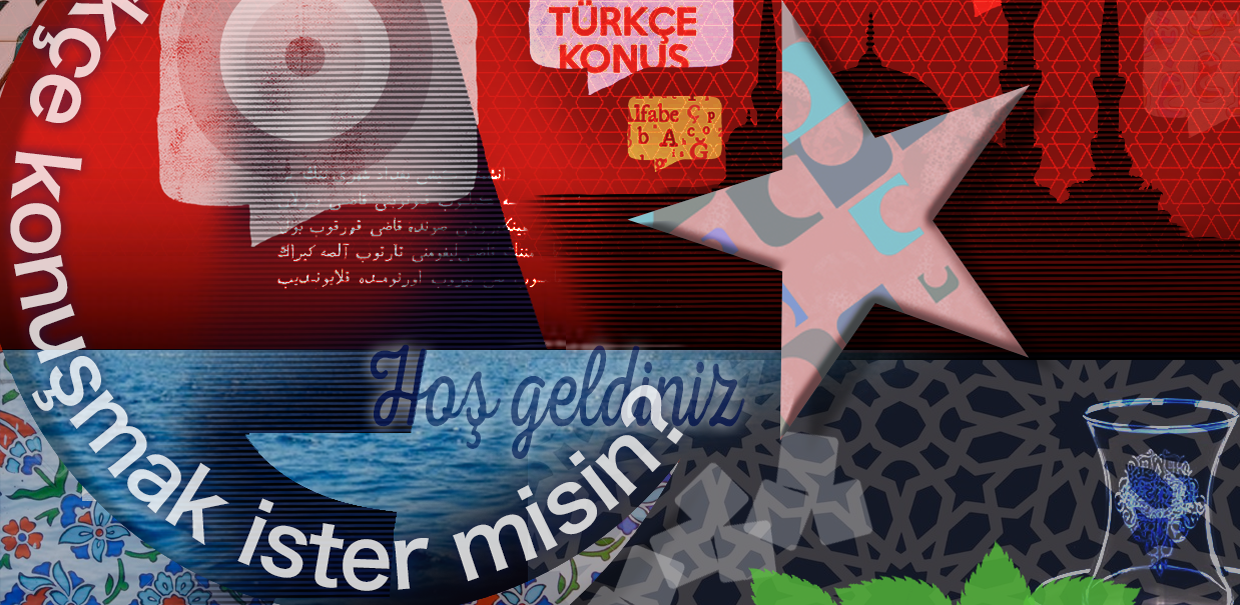
 Turkish belongs to the Turkic family of languages (such as Azerbaijani, Uighur, Uzbek, Tatar, Kazakh and Gagauz), which have been spoken for many centuries across a vast array of territories from the Balkans to China. Turkish is the most widely spoken member of the Oghuz branch of Turkic. Orhun Inscriptions are the earliest attested form of Turkic found in the early 8th century.
Turkish belongs to the Turkic family of languages (such as Azerbaijani, Uighur, Uzbek, Tatar, Kazakh and Gagauz), which have been spoken for many centuries across a vast array of territories from the Balkans to China. Turkish is the most widely spoken member of the Oghuz branch of Turkic. Orhun Inscriptions are the earliest attested form of Turkic found in the early 8th century.
Modern Standard Turkish was developed on the basis of the Istanbul dialect and is the descendant of Ottoman Turkish, which was developed in Anatolia by Oghuz Turks after they settled in that region in the eleventh to thirteenth centuries. The Latin alphabet, which replaced the previous Arabic script, was introduced in 1928. Turkish is an agglutinative language and uses suffixes. Turkish itself is spoken predominantly in the Republic of Turkey, by its population of over 78 million, of which it is the official language. Turkish speakers outside Turkey are located in various lands that were formerly, for several centuries, part of the Ottoman Empire. These include Bulgaria, Greece, Macedonia, Romania, and Northern Cyprus. There are also many Turkish speakers who have taken up residence in various western European countries, Australia and North America.
Turkish itself is spoken predominantly in the Republic of Turkey, by its population of over 78 million, of which it is the official language. Turkish speakers outside Turkey are located in various lands that were formerly, for several centuries, part of the Ottoman Empire. These include Bulgaria, Greece, Macedonia, Romania, and Northern Cyprus. There are also many Turkish speakers who have taken up residence in various western European countries, Australia and North America.
Turkish is also one of the ten most important foreign languages for the UK’s prosperity and global standing over the next 20 years, according to a report published in 2013 by the British Council.
Turkey is considered to be the gateway between Europe and Asia; it is a Eurasian country located on the Mediterranean Sea stretching across the Anatolian peninsula in southwest Asia and the Balkan region of southeast Europe. Turkey is a democratic, secular, unitary, parliamentary republic with a diverse cultural heritage.
For those seeking to visit Turkey it is recommended to visit the following websites:
https://www.ktb.gov.tr/?_dil=2
https://muze.gov.tr/muzeler
https://www.millisaraylar.gov.tr/en
https://kvmgm.ktb.gov.tr/TR-44094/istanbul-ayasofya-muze-mudurlugu.html
https://muze.gov.tr/
The Turkish government offers grants and scholarships for a variety of purposes. See https://turkeyscholarship.com/ for more details.
At the Language Centre, you can use our extensive collection of resources as well as enrol in one of our courses. The classes at all levels are functional-notional, particularly focusing on spoken language. In addition, Turkish culture and etiquette will be introduced as it relates to the linguistic information given. All Turkish courses are supported by multimedia online materials.
Qualifications framework level: CEFR A1
Prerequisites
For absolute beginners, or for those with very little knowledge of Turkish.
Educational Aims
At Basic 1 Level the main aims are:
- to develop a basic understanding and an appreciation of the salient linguistic features;
- To establish the learner as a fairly confident language user in a range of predictable every-day situations;
- To introduce students to the cultural background of Turkey within the context of language teaching.
Learning Outcomes
By the end of the Course students will be able to:
| Listening/Speaking | Understand basic instructions or take part in a basic factual conversation on a predictable topic. |
|---|---|
| Reading | Understand a set of basic notices, instructions or information. |
| Writing | Write a brief informal letter or e-mail on an every-day predictable topic. |
Topics
The Course introduces students to the following functions and notions:
- Greetings
- Introducing self, friends and family
- Describing your nationality, age and profession
- Talking about your daily life; expressing routines
- Asking about hobbies, free time activities, interests and expressing likes and dislikes
- Talking about past events
- Telling the time
- Shopping at the market or shop, inquiring about prices, size, quantity etc.
- Describing future events/plans
- Describing a dwelling, give/ask for address
- Talking about work/study, the timetable
- Understanding information relevant to travel, holiday and staying in a hotel
- Ordering food or drink and paying the bill
Syllabus:
Qualifications framework level: CEFR A2
Prerequisites: CULP Basic 1 / CEFR A1
Educational Aims
At the Basic 2 level the main aims are:
- To establish the learner as a confident language user in a range of predictable everyday situations;
- To further develop the understanding and an appreciation of the salient linguistic features of the language;
- To enhance students understanding of to the historical and cultural background of Turkey
Learning Outcomes
By the end of the Course students will be able to:
| Listening/Speaking | Express opinions on abstract/cultural matters in a limited way or offer advice within a known area, and understand instructions or public announcements. |
|---|---|
| Reading | Understand routine information and articles, and the general meaning of non-routine information within a familiar area. |
| Writing | Write brief letters or make notes on familiar or predictable matters. |
Topics
The Course introduces students to functions and notions such as:
- Talking about past, current and future events
- Describing your illnesses and symptoms
- Having a conversation with a doctor
- Talking about hobbies, free time activities, interests and habits.
- Talking about preference and replying invitation.
- Inviting people to an event.
- Talking about Turkey and your own country.
- Describing places, weather and nature.
- Understanding an advertisement about a holiday resort
- Describing what kind of holiday you would like to have.
- Shopping at the clothes shop, enquiring about prices, size etc.
- Talking about your ability
- Learning how to ask for permission.
- Shopping for electronic devices.
- Learning names of plants, flowers and animals.
- Talking about personality characteristics.
- Learning how to write a simple CV.
Syllabus:


 The Language Centre
The Language Centre
